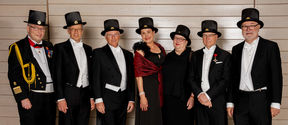Honorary doctors in technology 2023
Aalto University has granted seven Honorary Doctorates of Science in the field of technology. The new honorary doctors have all made significant impact in science, technology and society.

You have been developing, for example, the ability to monitor the function of brain cells using microchips. How would you define your main research areas?
In academia, our lives are determined by intellectual curiosity. I think that’s the driver. And of course, you must try to maintain some focus so that this intellectual curiosity can lead to something concrete that is scientifically meaningful in advancing that particular sector.
If I chronologically look at some of my research, there was an era when I was interested in magnetic semiconductors and a field called semiconductor physics. For the last 15 or 20 years, driven by a curiosity about the brain, I began to interact with colleagues here at Brown University who were experts in neuroscience and brain science.
Out of that came a direction, where the question is how we get close enough at a single neural cell level, close enough to record electrically, and to reconstruct the way that the brain acts as an exceptional computer, with extremely low power consumption.
That led me to work with brain scientists. And I should say that this is all about collaborations with experts in neuroscience in a field that is loosely called neuro-engineering.
You have received a number of official recognitions during your professional life. What do you consider to be the most valuable achievement of your career?
Actually, the answer in my mind is very simple: the reasonably substantial number of PhDs who have graduated from this laboratory and are doing good work all over the world. Numbers don’t mean that much here, but it probably would be on the order of 60 PhDs over the years. For me personally, that’s the achievement.
Scientifically, it’s hard to say. This current project is one of the most interesting ones. It also happens to be one of the hardest ones because we’re trying to compact a lot of electronic capability into a very tiny chip that needs to be also compatible with the biological environment, which is not very friendly toward microchips. And the body may not be that happy with the microchip either. So, there is not a day without encountering a problem.
Nevertheless, if we are successful in elevating this early neurotechnology concept to the level of operating it in a primate, and hopefully then in a human, then I think that would be perhaps considered an accomplishment that’s worth something.
You’ve been studying and working at top US universities for your entire career. What insights can you offer about that environment that might be helpful here in Finland?
I would say that the one thing is the availability of money. The ability to get research funding here, particularly for experimental research – the expensive kind of research that people like me do – is so much easier. Finland could be even better than it is now with enough resources invested.
The ceremonial conferment of the schools of technology at Aalto University will take place on Friday 16 June 2023. In the ceremony seven new honorary doctors will be conferred, one of whom is Arto Nurmikko.
Text: Panu Räty
Photo: Brown University
This article has been published in the Aalto University Magazine issue 32, April 2023.

Aalto University has granted seven Honorary Doctorates of Science in the field of technology. The new honorary doctors have all made significant impact in science, technology and society.

The 2023 Ceremonial Conferment of Technology at Aalto University



